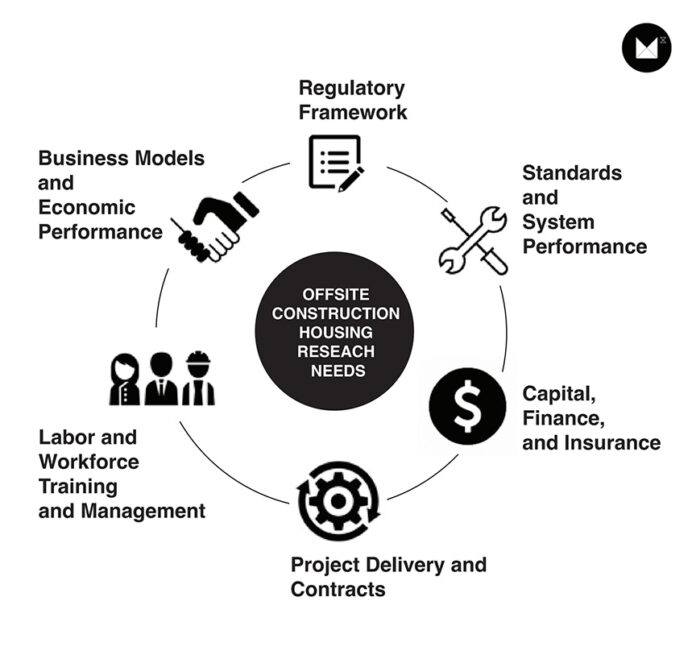We need to pursue a vision in which productized homes and buildings can be shipped to any US state without red tape.
- The patchwork of state standards for modular, panelized and other offsite systems puts a brake on industry growth.
- The new ICC/MBI standards are a good first step towards solving the problem, but more needs to be done.
- ICC is developing procedures that will allow factory-built homes to be certified as products. It also offers a comprehensive lineup of educational programs.

The US has a highly fragmented building regulatory landscape. States adopt different editions of the model codes and then add their own amendments. Some states leave code adoption to local governments.
The result is a confusing patchwork of regulations; a patchwork that’s inhibiting the growth of offsite construction.
As readers of this magazine know, offsite is an approach where large parts of buildings are completed in factories. Those factories rely on efficient, standardized manufacturing processes to deliver panels, modules and other components, saving the builder time and money and making it easier to meet housing demand. Standardized components also address tough challenges like affordability and sustainability.
Another strength of offsite-built projects is that they meet the same building code requirements as site-built. However, this also creates a problem: because code requirements vary so much, the factory has to tailor its products to meet the code requirements of each jurisdiction it ships to.
This can eat into profits and the inherent efficiencies in the manufacturing process, which leads a lot of factories to focus on a small handful of market areas, rather than pursuing the expansion that they could if there were more uniformity.
The US Department of Housing and Urban Development (HUD) recognized the problem in its Offsite Construction for Housing: Research Roadmap, published in 2023. The Roadmap named regulation and policy (among other issues) as areas in need of attention.
The International Code Council (ICC) — the organization I work for — has taken up the challenge. In collaboration with key partner organizations such as the Modular Building Institute (MBI), we are developing standards for offsite construction and are working to get them adopted by states across the US. (See Implementing the New Offsite Standards in this issue.)
ICC is also developing processes that will allow modules, panels and other elements to be certified in a manner similar to other building products.

Building on State Programs
The ICC/MBI standards draw on best practices from existing state offsite programs. Thirty-nine states have programs that regulate offsite construction, but program requirements vary from state to state. This variation slows down production because workers must build to different details for each state the factory serves.
Other variations between states include the types of projects (residential or commercial) and offsite construction methods (panelized or volumetric) covered by the program, as well as what quality assurance documentation the manufacturer needs to provide.
There are also different inspection requirements. Some states allow third-party agencies like ICC/NTA to perform plan review and in-factory inspections, while others only let state employees perform these functions. This can impact timely approvals of projects, again limiting the attractiveness of offsite construction.
In states without a statewide offsite construction program, local officials are responsible for approving and monitoring these projects. Unfortunately, many local building departments lack the experience or capacity to do this effectively.
Developers and manufacturers can negotiate with local governments to allow a qualified third-party like ICC/NTA to get the approvals and to do the in-factory inspections for a specific project. Of course, the need to negotiate each project is very inefficient.
The need for regulatory consistency in the regulatory process is so strong that the National Association of Home Builders, led by their Building Systems Councils, recently passed a resolution calling for adoption of the ICC/MBI standards.
The more states that adopt the ICC/MBI standards, the more consistency there will be. This will remove a roadblock that keeps factories from expanding geographically.

Houses as Products
The ICC/MBI standards require an inspection for each unit produced at the factory. But is there a way to reduce the number of inspections?
We believe that productization will help. ICC is working on a set of processes that will allow certain components to be certified in the same way that a piece of mechanical equipment is certified by Underwriters Laboratory (UL), or an electronic device by the Federal Communications Commission (FCC). Certification will be provided by the ICC Evaluation Service and will include specifications for the quality assurance process as well as random factory inspections.
This isn’t a new idea. The product evaluation process is already widely accepted for structural insulated panels (SIPS) and acceptance criteria exists for verification of shipping containers used as building materials, for cross laminated timber panels and for metal building systems. We’re simply extending this to other offsite components.
Once product certifications for offsite components are fully developed, we will work on getting them accepted by building officials across the country. This will help drive acceptance by designers, contractors and developers.
A good example of where this approach offers value is bathroom pods. If pods are certified as products, builders and developers will be more willing to use them. Certification will also give factories more incentive to invest in automation and other improvements.
Another area of opportunity is panelization. All state offsite construction programs address volumetric modules, but they vary in their coverage of panelized systems. This breeds confusion among panel companies and makes them less willing to invest in advanced manufacturing and delivery technologies.
In response, ICC is working on a Guideline on Advanced Panelization to be released later this year. It will leverage the product evaluation process and a robust quality assurance and inspection process and will treat panels like other building components.
Educational Resources
Education is also crucial to advancing offsite construction. Fortunately, a number of resources are available.
The ICC has produced a primer capturing the regulatory approaches for the many types of offsite construction. The primer is beneficial for builders, manufacturers and code officials.
ICC has educational content that includes an introduction to offsite construction and courses on the ICC/MBI standards are also available. We also offer a Credential of Learning Achievement (CLA) on the standards to allow building industry professionals to document their expertise.
Other offerings include courses and resources on specific types of offsite construction. For instance, tiny houses, a growing segment, can be used as standalone dwellings or as accessory dwelling units (ADUs), but confusion abounds as to which standards or codes they need to meet in each situation. (The IRC? The HUD code? Recreational vehicle standards?)
To help dispel the confusion, ICC has developed resources that include the International Tiny House Provisions and Navigating Certification and Regulation for Tiny Houses. A standard (ICC/THIA 1215) is also in the works.
The Future
It should be obvious that an effective and growing offsite construction industry requires consistent standards. Product certification, as well as adoption of the ICC/MBI standards at the state level, will be an important step in this direction, but other steps are also needed.
HUD is developing a strategic plan to advance offsite construction in the US. As part of that effort, they will examine, and draw lessons from, the use of offsite construction in other countries, including the United Kingdom, Japan and Sweden.
The bottom line is that the regulatory process should facilitate the efficient, safe, affordable and sustainable delivery of offsite construction projects. The International Code Council is dedicated to making this happen. Doing so will help ensure a bright future for offsite construction.
To learn more about the ICC’s offsite construction initiative or to get involved in the conversation, visit iccsafe.org/offsite.
Ryan Colker is Vice President for Innovation at the International Code Council. Images provided by the author.







